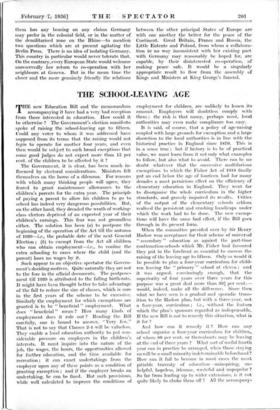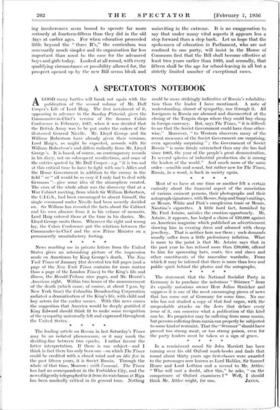THE SCHOOL-LEAVING AGE
THE new Education Bill and the memorandum accompanying it have had a very, bad reception from those interested in education. How could it be otherwise ? The Government's election manifesto .spoke of raising the school-leaving age to fifteen. Could any voter to whom it was addressed have supposed from its terms that the raising would not begin to operate for another four .years, and even then would be subject to such broad exceptions that some good judges do not expect more than 15 per cent. of the children to be affected by it ?
The Government, it is clear, has been much in- fluenced by electoral considerations. Ministers felt themselves on the horns of a dilemma. For reasons with which many thinking people will agree, they feared to grant maintenance allowances to the children's parents for the extra year. The principle of paying a parent to allow his children to go to school has indeed very dangerous possibilities. But, on the other hand, they dreaded the wrath of working- class electors deprived of an expected year of their children's earnings. This fear was not groundless either. The solution has been (a) to postpone the beginning of the operation of the Act till the autumn of 1989—i.e., the probable date of the next General Election ; (b) to exempt from the Act all children who can obtain employment—i.e., to confine the extra schooling to cases where the child (and the parent) loses no wages by it.
- Such appear to an objective spectator the Govern- ment's deciding motives. Quite naturally they are not to the fore in the official documents. The postpone- ment till 1939 is attributed to the falling birth-rate. It might have been thought better to take advantage of the fall to reduce the size of classes, which is sure in the first years of the scheme to be excessive. Similarly .the employment for which exemptions arc granted is to be " beneficial " employment.. What does " beneficial " mean ? How many kinds of employment does it rule out ? Reading the Bill carefully, one is bound to answer, " Very few." That is not to say that Clauses 2-4 will be valueless. They enable a local education authority to put con- siderable pressure on employers in the children's interests. It must inquire into the nature of the job, the wages, the hours, the opportunities allowed for further education, and the time available for recreation.; it can exact undertakings from the employer upon any of these points as a condition of granting exemption ; and if the employer breaks an undertaking, he can be fined. But such provisions, while well calculated to improve the conditions of employment for children, are unlikely to lessen its amount. Employers will doubtless - comply with them ; the risk is that many, perhaps most, local authorities may even make compliance too easy.
It is said, of course; that a- policy of age-raising coupled with large grounds for exemption and a large discretion to the local authorities is in line with the historical practice in England since 1870: This is in as sense true ; but- if- history is to be of practical value, we must learn from it not only what exam pies to follow, but also what to avoid. There can be no doubt whatever that the successive multifarious exemptions to which the Fisher Act of 1918 finally put an end below the age of fourteen had for many decades a most pernicious effect on the efficiency of elementary education in England.' They . went far to disorganise the whole curriculum in the higher standards, and gravely impaired its results. Critics of the output of the elementary schools seldom realised the persistent and crushing handicaps under which the work had to be done. The new exemp- tions will have the same bad effect, if the Bill goes through in its present form.
When the committee presided over by Sir Henry Hadow won acceptance for their scheme of universal " secondary " education as against the part-time continuation-schools which Mr. Fisher had favoured they put in the forefront as essential to success the raising of the leaving age to fifteen. Only so would it be possible to plan a four-year curriculum for child- ren leaving the " primary " school at eleven ; and it was argued, convincingly enough, that the superiority of four years over three years for this purpose was a great deal more than 331, per cent.— would, indeed, make all the difference. Since then what we have seen is a gradual and sporadic trans- ition to the Hadow plan, but with a three-year, not a four-year, curriculum ; i.e., without the feature which the plan's sponsors regarded as indispensable. If the new Bill is not to remedy this situation, what is it for ? • And how can it remedy it ? How can any school organise a four-year curriculum for children, of whom 80 per cent. or thereabouts may be leaving at the c nd of three years ? What sort of useful fourth year can in practice be arranged, when those staying on will be a small minority indeterminable beforehand ? How can it fail to become in most cases the most pitiable travesty of education—uninspiring, un-. helpful, hopeless, irksome, wasteful and unpopular ? So. far. from leading up to wider extensions, is it not quite likely to choke them off ? All the accompany- ing incoherences seem bound to operate far more seriously at fourteen-fifteen than they did in the old days at earlier. .ages. For when education proceeded little beyond the " three R's," the curriculum was necessarily much simpler and its organisation far less important than must be the case for the advanced boys and girls today. Looked at all round, with every qualifying circumstance or possibility allowed for, the prospect opened up by the new Bill seems bleak and uninviting in the extreme. It is no exaggeration to say that under many vital aspects it appears less a step forward than a step bank. Let us hope that the spokesmen of education in Parliament, who are not confined to one party, will insist in the House of Commons first that the Bill shall become effective at least two years earlier than 1939, and secondly, that fifteen shall be the age for school-leaving in all but a strictly limited number of exceptional cases.















































 Previous page
Previous page